Author Archives: Helene Meyers
June 23, 2017 by Helene Meyers
Flying While Female on El Al
 Jewish feminists are celebrating the ruling that El Al airlines can no longer ask women to change seats in order to accommodate Haredi men who believe it is their religious prerogative not to sit next to women. The suit arguing that such religious accommodations are gender discrimination was brought not by a young upstart but rather by an 81 year-old Holocaust survivor, Renee Rabinowitz, with the support of the Reform Movement’s Israel Religious Action Center. According to the Times of Israel, Rabinowitz changed her seat at a flight attendant’s request but the wrongness of the request rankled her.
Jewish feminists are celebrating the ruling that El Al airlines can no longer ask women to change seats in order to accommodate Haredi men who believe it is their religious prerogative not to sit next to women. The suit arguing that such religious accommodations are gender discrimination was brought not by a young upstart but rather by an 81 year-old Holocaust survivor, Renee Rabinowitz, with the support of the Reform Movement’s Israel Religious Action Center. According to the Times of Israel, Rabinowitz changed her seat at a flight attendant’s request but the wrongness of the request rankled her.
Dana Cohen-Lekah, Jerusalem’s Magistrate Court Judge, was unambiguous in her judgment: “Under absolutely no circumstances can a crew member ask a passenger to move from their designated seat because the adjacent passenger doesn’t wasn’t [sic] to sit next to them due to their gender…. The policy is a direct transgression of the law preventing discrimination.” Hopefully, this ruling will end the disruptions and delays that often attend demands for gender-segregated seating.
Renee Rabinowitz’s legal triumph reminded me of the Jewish feminist anguish that I experienced on an El Al flight several years ago.
- No Comments
May 31, 2017 by Helene Meyers
Serious Missteps in Dirty Dancing Remake
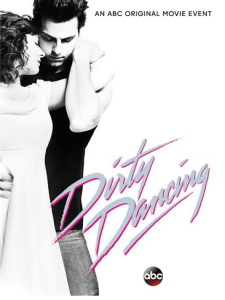 I was critically warned not to watch ABC’s remake of “Dirty Dancing”. But I’m a Jewish feminist film critic, so I don’t simply follow directions. I also know that remakes are notoriously and often unfairly judged only in relation to the idolized original. So I wanted to see for myself the 2017 reinterpretation of this iconic 1987 film about a Jewish smart girl who discovers that she has a body as well as a mind.
I was critically warned not to watch ABC’s remake of “Dirty Dancing”. But I’m a Jewish feminist film critic, so I don’t simply follow directions. I also know that remakes are notoriously and often unfairly judged only in relation to the idolized original. So I wanted to see for myself the 2017 reinterpretation of this iconic 1987 film about a Jewish smart girl who discovers that she has a body as well as a mind.
Thank the Goddess, I didn’t watch it with commercials on Wednesday night, but I did give in to movie masochism over the Memorial Day weekend, courtesy of Hulu. Much as I would just like to forget about this astonishingly bad film, I think the specific left feet of this remake demands attention through a Jewish feminist lens.
Yes, as many professional critics and lay viewers note, the dancing is uneven at best, abysmal at worst, and I agree with the tweeter who suggested that Patrick Swayze must be turning over in his grave. Yes, the decision to have the 2017 Baby/Francis (Hannah Breslin) and Johnny (Colt Prattes) sing as well as dance doesn’t inspire confidence in the aesthetic vision undergirding this film. But it’s what the film does to Jewish smart girls and to feminist politics in 2017 that is depressingly instructive.
- 1 Comment
April 12, 2017 by Helene Meyers
Cinematic Sustenance for a Jewish Feminist Exodus
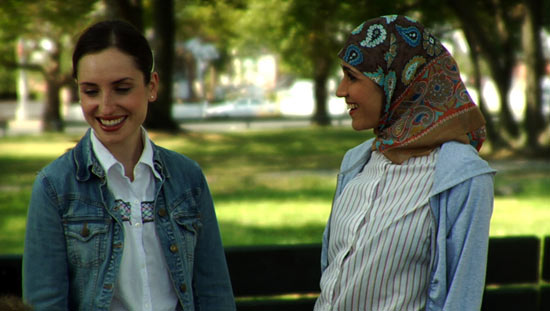
Arranged
Let’s face it: the U.S. today is looking a lot like Mitzrahim, the narrow straits of Egypt from which the Israelites needed to be liberated. Jews and Muslims increasingly feel the binds of anti-Semitism and Islamophobia. Legislators are trying to turn bathroom stalls and doctors’ offices into new borders to police. The Statue of Liberty weeps as the Trump administration tries to make deportations, bans, and walls the law of the land.
Jon Stewart got it right when he called out the Trump presidency for being exhausting and reminded us that “the presidency is supposed to age the president, not the public.” At Passover, we ritually re-enact the journey from slavery to freedom. This year especially, we need to resist exchanging one narrow place for another. This is a moment for alliance politics, even as resistance fatigue becomes a clear and present danger. For me, beloved indie films from my recent and distant past provide sustenance; they energize, engage, and re-educate my intersectional Jewish feminist soul for the long political journey ahead.
So let me share a list of five flix worth watching or re-watching. They’re fun and/or hopeful without being fluff. All of these picks speak to the present moment as they forge identity and alliance politics in often counterintuitive ways (news flash: those two forms of politics aren’t oxymoronic, despite what the likes of Mark Lilla might have us believe; see airport protests in response to the first Muslim ban as evidence of this). May such cinematic comfort food help us to productively and empathetically cross the borders of interlocking liberation movements.
- No Comments
December 30, 2016 by Helene Meyers
Celebrating 7 Jewish “Nasty Women” of 2016
One of the many low points of this year occurred when Donald tried to diss Hillary by calling her a “nasty woman.” Yet feminists across the country immediately rebranded his intended insult: we knew that Donald’s “nasty woman” is one who talks back to bullies, who is competent and in command of facts, and who tweets for a better and more perfect union for all of us.
Jewish feminists in particular have lots of experience reclaiming the insults meant to silence us. In keeping with Lilith’s tradition of praising big-mouthed Jewish women, let’s celebrate seven of the Jewish “nasty women” who made news in 2016 (7 is the number associated with creation and blessing in Jewish tradition). May their collective work inspire us to each do our part to repair a very broken world.
- No Comments
November 22, 2016 by Helene Meyers
Shiva Ribbons, Not Safety Pins
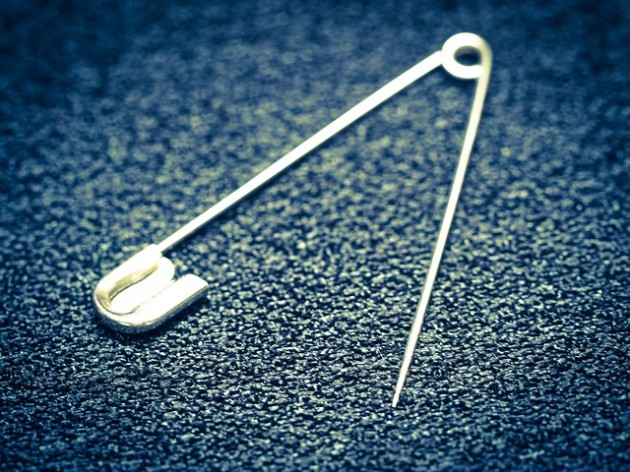 Taking a cue from those coping with Brexit across the pond, political fashionistas are sporting safety pins as a sign of alliance with those feeling even more vulnerable than usual after the election: immigrants, Muslims, people of color, women of all colors, lgbtq folks, to name just a few. As Bex Taylor-Klaus tweeted, “My #SafetyPin shows I will protect those who feel in danger bc of gender, sexuality, race, disability, religion, etc. You are safe with me.”
Taking a cue from those coping with Brexit across the pond, political fashionistas are sporting safety pins as a sign of alliance with those feeling even more vulnerable than usual after the election: immigrants, Muslims, people of color, women of all colors, lgbtq folks, to name just a few. As Bex Taylor-Klaus tweeted, “My #SafetyPin shows I will protect those who feel in danger bc of gender, sexuality, race, disability, religion, etc. You are safe with me.”
The safety pin movement is, of course, well-intentioned. It seeks to acknowledge diverse forms of privilege. Although those who view a vote for Trump as a hate crime against the republic are all in this together, the safety pin police rightly affirm that some are more immediately affected by a Trump presidency than others, that we’re not all feeling the same sort of terror. Yet this show of solidarity strikes me as misguided and even offensive for many reasons. It’s not only “embarrassing” and fastens over the fact that white people overwhelmingly voted for Trump, as Christopher Keelty has argued. It’s also paternalistic and presumptuous. Individual promises to protect one another are largely empty when it comes to mob and state-sanctioned forms of violence against classes of people. As history teaches us—over and over again—the kindness of strangers simply isn’t adequate when a cozy band of puppeteers that includes the likes of Stephen Bannon take control of democratic institutions and allow them to run amok.
- No Comments
April 21, 2016 by Helene Meyers
The Narrowness of Media Boys Clubs: A Primary Passover Story
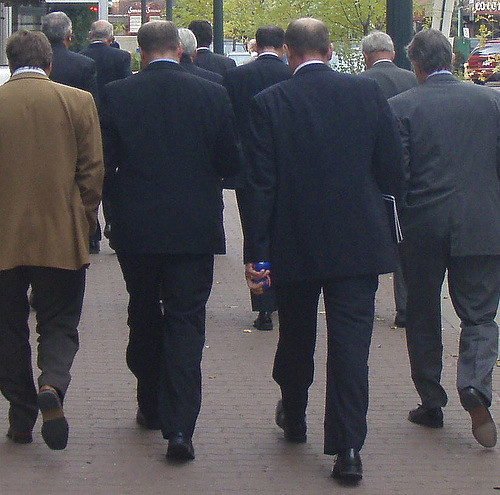
Flickr.com, Anthony Easton
On April 5, JTA (the Jewish Telegraphic Agency, a Jewish news agency) issued a mea culpa for their list of the 25 Most Influential People on Jewish Twitter. Their original list included only 3 women, and a Times Of Israel piece by Jeremy Burton called them on it.
JTA recalibrated the list by excluding those who belong to the Jewish organizational world (which they identified as “a world that has been shown to be largely dominated by male leaders,” i.e., a boys club) and ended up with 8 women, “a more respectable showing.” But most importantly, they seemed to really get it. They admitted that they should have noticed that women were missing in action on the list, and they didn’t try to dodge Jewish accountability even as they rightly pointed out that the Jewish world is far from the only narrowly male realm (I’m an academic; believe me, I know lots about boys clubs, otherwise known as administration and boards of trustees).
Andrew Silow-Carroll ended this “response to the response” to JTA’s Jewish Twitter Ranking with “So we agree with Burton’s overarching message. The Jewish community still has a lot to do in order to address a gender gap in positions of influence. It’s an issue that goes way beyond the confines of Twitter.” As a feminist academic who spends way too much time legitimizing Jewishness to my non-Jewish sisterhood, I was energized by a major Jewish news service validating feminist work.
Fast forward to the day before the New York presidential primary. My inbox contained a listserv message from Steven Cohen, a social scientist whose work I admire a great deal and cite, though I don’t always agree with him. He included a link to a piece he wrote for JTA as a Jewish supporter of Bernie Sanders. After clicking on the link, I realized that his piece was part of a series titled “Ahead of NY Primary, Jewish Supporters Make the Case for Each Candidate.”
Even before I reached the op-ed on Trump, I had the sensation of being sucker punched. While Steven was for Sanders, Stuart wrote for Clinton, Nick supported Cruz, Bradley rallied behind Kasich, and Jason opined for Trump. Yes, all the invited Jewish op-ed writers were men.
- No Comments
December 22, 2015 by Helene Meyers
7 Jewish Feminist Highlights of 2015
2015 is leaving us with too much violence and a world that needs much repair. For me, the hateful murder of Shira Banki at the Jerusalem Pride Parade in August and the National Women’s Studies Association’s noxious BDS resolution were two Jewish feminist low points of this secular year. But other, joyous moments have helped me keep the faith that Jewish feminism can and does make a difference by doing the work of tikkun olam in Jewish worlds, in feminist movements, and in the world entire. So in keeping with that spirit, I offer my top 7 Jewish feminist moments of 2015 (and, of course, 7 is the number associated with creation and blessing in Jewish tradition!).
 1) Rebecca Goldstein, who has embodied and given literary life to “mind-proud” women throughout her career, was awarded the National Humanities Medal. If you haven’t yet read The Mind-Body Problem, Mazel (winner of the National Jewish Book Award), or 36 Arguments for the Existence of God, treat yourself to the words and the worlds of a brilliant writer.
1) Rebecca Goldstein, who has embodied and given literary life to “mind-proud” women throughout her career, was awarded the National Humanities Medal. If you haven’t yet read The Mind-Body Problem, Mazel (winner of the National Jewish Book Award), or 36 Arguments for the Existence of God, treat yourself to the words and the worlds of a brilliant writer.
2) Another one of my sheroes, Ruth Bader Ginsburg, Supreme Court Justice and graduate of Brooklyn’s James Madison High School (my alma mater), was recognized with the Radcliffe Medal, given “to an individual who has had a transformative impact on society.” This “tiger justice,” of course, was a key vote in the landmark decision legalizing gay marriage. And the publication of Notorious RGB (and the upcoming film version of this legal titan’s life starring Natalie Portman) is a sign that intelligent life and popular culture can and do coexist. 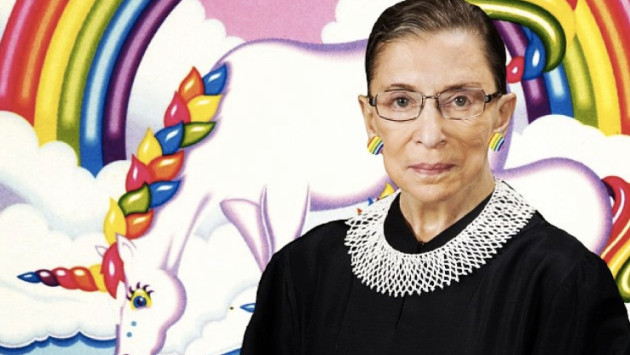
- 2 Comments
September 21, 2015 by Helene Meyers
Holy and Unholy Tweets
The upcoming week is a sacred one for both Jews and Muslims. Tuesday night ushers in Yom Kippur, the Day of Atonement that is the climax of the 10 Days of Awe and is the holiest day of the Jewish year. Traditional Yom Kippur observances include a full day of fasting followed by communal break-the-fast meals. Many congregations run food drives to assuage the hunger in their communities that is neither voluntary nor holy.
Wednesday night ushers in Eid al-Adha, the 4-day Festival of Sacrifice that marks the willingness of Ibrahim to sacrifice Ishmael and God’s ultimate substitution of a sheep for the son that was a gift to Ibrahim (the Jewish version of this story is known as the Binding of Isaac). Eid al-Adha marks the end of the Haj, the pilgrimage to Mecca that observant Muslims are required to make at least once in their lifetime if they are able; observances of Eid al-Adha, also known as the Greater Eid, include communal meals, the exchange of gifts, and donations to the poor.
This close proximity of Jewish and Muslim holy days is a welcome counter to the close proximity of bigotry that has plagued Jews and Muslims during this past week. On Tuesday, in Irving, Texas, Ahmed Mohamed, an intellectually ambitious and adventurous ninth-grader, was taken into police custody for bringing to school a clock that he had made; the clock, a sign of his inventiveness and smarts, was mistaken for a device of terror. Despite official denials, Ahmed’s Muslim heritage and his name surely contributed to the decision to handcuff first and ask questions later. Displaying an ability to serve as educator-in-chief and to use social media for the common good, President Obama tweeted “Cool clock, Ahmed. Want to bring it to the White House? We should inspire more kids like you to like science. It’s what makes America great.”
On Wednesday, Ann Coulter, one of our chief provocateurs for the common bad, was nonplussed by the support for Israel expressed by several Republican candidates toward the end of the debate on September 16th. Shocking even those of us who are acutely aware of diverse forms of contemporary anti-Semitism, she tweeted “How many f—ing Jews do these people think there are in the United States?” Of course, the Jewish tradition of responding to insult with humor became general across the Twitterverse. Referring to the missing letters in “f—ing,” Yair Rosenberg usefully noted, “The best part of this tweet is how Ann Coulter censored the language to avoid offending people.” AJ Jacobs matched stats from the Kinsey Institute on sexual activity with Jewish demographic info to compute how many Jews have fornicated in the last month and how many were likely doing so while Coulter was tweeting.
Less funny was the unambiguous hatred that proliferated in replies to her tweet and with the hashtag #IStandwithAnn. These tweets ranged from “the Jewish community does not care about Americans” to resurrected charges of deicide to a hideous image titled “Swindlers List,” which featured a photo of Obama framed by a black star of David overlaid with the words “Rothchild’s Choice”; photos of Jewish male staffers (e.g., Rahm Emanuel, Larry Summers) are positioned at each point of the star. Coulter, like officials in Irving, Texas, went into denial mode. Notably, she tried to deflect any anti-Jewish meaning to her tweet by ascribing anti-Semitism to Hispanics and Mexican immigrants, a.k.a. “foreigners.”
My favorite answer to Coulter’s f—ing question came from Jennifer Weiner, who tweeted “You’re about to hear from all of them.” May 5776 be a year when all Jewish feminists are heard from, when we say “no” to anti-Semitism and Islamophobia, when we say “no” to those who use social media to play pernicious games of divide and conquer. May 5776 be a year when we say “yes” to the hard but necessary work of building and sustaining progressive alliances across ethnic, racial, and religious fault lines. May our 140 character messages and our longer-play writing help us to connect diverse religious and secular traditions that might make for a more peaceful world. Shanah Tovah and Eid Mubarak.
Helene Meyers is Professor of English and McManis University Chair at Southwestern University. You can follow her at @helene_meyers
- No Comments
August 3, 2015 by Helene Meyers
How Rainbow Jews Threaten a Black and White Haredi Worldview
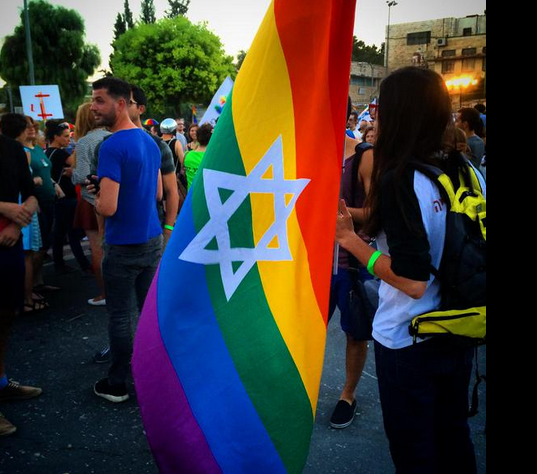
It is tempting to read Yishai Schlissel’s terrorist act at the Jerusalem Pride Parade, which we now know claimed the life of Shira Banki, a 16-year-old marcher, as confirming the opposition between the religious and secular realm. The common adjectives used to describe Schlissel are ultra-Orthodox or haredi. That oft-repeated descriptor not only reflects but also shapes the unfortunate reality that many in the ultra-Orthodox Jewish community zealously guard homophobia as an essential and eternal value sanctified by Torah. Those who decried the stabbings committed by Schlissel but nonetheless referred to the Pride Parade as “the abomination parade” represent such zealous homophobes. Of course, the language of abomination is biblical language used to describe any number of transgressions. However, an anti-historical reading of Leviticus 18:22, the passage that declares it an abomination for men to lie with one another as they would with a woman and implicitly renders lesbians invisible and even unthinkable, is the proof text that continues to be used to justify homophobia.
Even Israeli security forces assume the secularism of marchers and the homophobia of the haredim. According to Haaretz, “In security briefings before the event, there were clear instructions to stop any ultra-Orthodox person nearing the inner circle of the parade, with police instructed to ask them to identify themselves and state their business at the parade. Moreover, police were asked to pay special attention to any possible Haredi masquerading as a secular Israeli.” When we assume that ultra-Orthodox or haredi Jews are necessarily and eternally homophobic, we forget that ultra-Orthodoxy has a history and presumably a future, one not written on stone tablets. Even more importantly, such a reductive narrative belies the possibility and the experience of queer ultra-Orthodoxy.
- 1 Comment
July 6, 2015 by Helene Meyers
Communal Mourning: “Dylann Roof Acted Alone, But He Did Not Stand Alone”
In many Reform congregations, it is customary for the entire congregation and not just those who are halachic mourners to stand while saying Kaddish. This deviation from traditional practice is designed to provide community for those who are actively mourning: no one who mourns should stand alone. And this practice also acknowledges a communal responsibility to say Kaddish for those who have no one to do so.
Such a communal approach to mourning might guide us as we continue to come to grips with the atrocity that was committed in the Emanuel AME Church in Charleston, South Carolina. All people of conscience, whether that conscience is derived from religious or secular traditions, need to stand with the family and friends of the victims of that terrorist attack. We need to remember the names of those who met their death simply for praying while black : Depayne Middleton Doctor, Cynthia Hurd, Susie Jackson, Ethel Lance, The Reverend Clementa Pinckney, Tywanza Sanders, Daniel Simmons Sr., Sharonda Coleman-Singleton, and Myra Thompson.
And part of our communal responsibility is to acknowledge that although officials believe that Dylann Roof “acted alone,” he did not stand alone. Based on what we currently know, Roof did not have active collaborators in this terrorist plot. But he communicated online with white supremacists, his father bought him a gun, his roommate listened to him make plans to “start a civil war,” those who knew him in high school heard him make racist jokes and wrote them off as “Southern Pride” and “strong conservative beliefs.” His home state of South Carolina flies a Confederate flag at its Statehouse and judging from his Facebook page, he was inspired by the apartheid history of South Africa and Zimbabwe (formerly Rhodesia). Vigils and services designed to promote solidarity across racial and religious lines were disrupted by bomb threats. In the chilling manifesto that Roof likely wrote, he took aim at Blacks, Hispanics, Asians, and Jews; although his anti-Semitic complaint is that the Jews “network,” his ideology of hate is advanced by new technologies. Dylann Roof did not and does not stand alone. And thus those of us of conscience who did not personally know Depayne, Cynthia, Susie, Ethel, Clementa, Tywanza, Daniel, Sharonda, and Myra must be sure that their immediate mourners and communities are not standing alone.
Helene Meyers is Professor of English and McManis University Chair at Southwestern University. Most recently, she is the author of Identity Papers: Contemporary Narratives of American Jewishness , which includes a chapter on the color of white Jewry. She is currently writing a book on Jewish American cinema.
- No Comments
 Please wait...
Please wait...